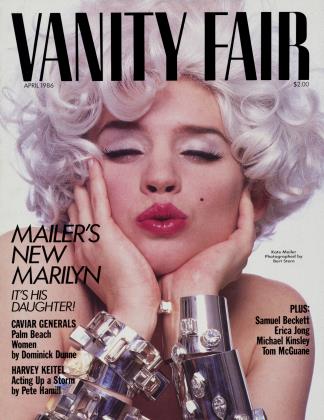Sign In to Your Account
Subscribers have complete access to the archive.
Sign In Not a Subscriber?Join NowGood Humor Man
COMEDY
Leno's laughing matters
Photographs STEVEN ARNOLD
STEVEN ARNOLD
Jay Leno has graduated from strip joints to Carnegie Hall with his egalitarian brand of humor.
In the Green Room of NBC-TV’sLate Night with David Letterman, comedian Jay Leno, who will be the first guest of the evening, offers me a Coke. “Drink up—Letterman’s paying,’’ he says. “Here, put a couple in your purse.”
Letterman has called Leno “the funniest comedian working today,” and has had him on the show nearly thirty times. Leno is the tall, Elvisy-looking guy who rails against junk culture— something like a hip Andy Rooney— and lets off steam over what’s “needling” him.
He won a lot of us over with his Miss America contestant (“I want to bring peace to the entire world and get my own apartment”) and kept us with him when he said, of Nancy Reagan’s being given a humanitarian award, that he was “sure glad she beat out that conniving bitch Mother Teresa.”
He has wheeled onstage in full leather astride a Harley-Davidson (he owns twelve motorcycles himself), and he has brought along a porno film, whose star, according to Leno, was Letterman early in his career. “You can do anything here,” Leno says. Letterman is not mired in formula, “like some other shows: Here’s what we did when Abbott and Costello were on.”
The appearances on Late Night have helped the “King of the Comedy Clubs” to fill larger nightclubs and theaters during the ten months of the year he’s on the road. The successful club dates, in turn, helped secure a March 29 solo show at Carnegie Hall—this for the former Rolls-Royce mechanic whose comedy career began in strip joints.
Jay Leno takes his shots at the culture from within, not from above. His is adult humor, not X-rated but “for someone who’s dealt with banks, who’s had a job.” His material is egalitarian, and remarkably clean; he doesn’t rely on what he calls “the wrong kind of laugh.” And he takes the brunt of the occasional heckler. Whereas Bob Goldthwait comes back with “When the
scum get together, they call you ‘Boss,’ ” and Martin Mull, years ago, had “Isn’t it sad when cousins marry?” Leno, interrupted onstage, simply says, “God forbid the boring prepared material.” He has no score to settle, unless it’s with those who don’t give us any credit. About the ending of a popular
adventure show he marvels, “Who’d have guessed that was going to happen—again this week!”
Over the years he has also punched up sitcoms and been in a couple of movies. This despite a casting agent’s appraisal: “You’re very funny, but we’re afraid you’d be frightening to children.”
Back in the Green Room, Leno describes the clubs where he started
out, the kind of place where “you’d go outside and there’d be two girls on the fender of a car. And one of the girls would be saying, ‘I know Billy didn’t mean to hit me...’ ” And the club down South where the owner bought dinner for the performers: “I was headlining,” Leno recalls, “so the owner says, ‘You can have anything on the menu.’ To the middle guy he says, ‘You can have one of the salads.’ And to the opening act, ‘There are some sandwiches in cellophane down the hall.’ ” Leno does his “steamed” look. “It was like ‘If I don’t finish my baked potato, can I give it to him?’ ” A friend who has played the same club reminds Leno that “only the M.C. could have cheesecake,” which sets him off on tales of other nightmares—a talk show in Chicago where the other two guests were Adrian Zmed of T. J. Hooker,and Q Dr. Jonas Salk. “The segues on i these shows,” says Leno in dis1 belief. Mimicking the host: | “Speaking of genocide—Julia, " you’ve written a cookbook. Leno remembers another show, on which he appeared with astrologer Joyce Jillson and former president Gerald Ford. “Merv asked Ford about the Mideast crisis, then turned to me and said, ‘What do you think, Jay?’ ”
Offstage, Leno has fewer complaints. He lives in Hollywood with his wife, Mavis, a writer (Leno has referred to books as “cordless mini-series”), and at thirty-five he is paid a fortune to do what he likes to do.
It’s only when he fills out his tax form for the I.R.S. that Leno feels a little silly. “You put down Tee-Hee’s one week, Chuckles the next, then the Comedy Store, the Comedy Cottage, the Comedy Castle, the Comedy Womb...”
Next month, the cable channel Showtime will air a one-hour special, Jay Leno—The American Dream. Is the title ironic? “You can participate in the culture and still be aware that you’re being manipulated,” Leno says. “You don’t have to dislike something to be sarcastic about it.”
Amy Hempel
 View Full Issue
View Full Issue


















Subscribers have complete access to the archive.
Sign In Not a Subscriber?Join Now